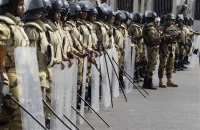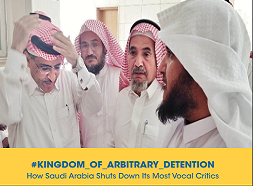Egypt: UN Must Call on Authorities to Refrain from Adopting New Anti-Terrorism Law
On 7 July 2015, Alkarama sent a letter to the United Nations Special Rapporteur on the promotion and protection of human rights and fundamental freedoms while countering terrorism (SRCT) to ask the Egyptian authorities to refrain from adopting a new draft anti-terrorism law. Approved both by the Cabinet and the Supreme Judicial Council on 5 July 2015, this draft law is awaiting ratification by the President of the Republic. To Alkarama, it is a de facto an emergency law as it gives extraordinary powers to the security forces and to the President of the Republic while jeopardising Egyptian citizens' fundamental rights.
This draft comes after a week of violence in Egypt that saw the killing of Hisham Barakat, Egypt's Chief Prosecutor, in an attack that also killed members of his staff and a bystander, on 29 June. Reacting to these deaths, President Al Sisi had promised to implement harsher laws and to accelerate the course of justice to swiftly implement the deaths sentences handed against real and alleged political opponents. This violence was exacerbated by attacks led by militants against the army in the Sinai region on 1 July that saw the death of at least 21 soldiers, according to official figures.
The authorities consequently decided to adopt a new anti-terrorism law of which the draft is available in Arabic online. Similar to the November 2014 Law on terrorist entities, this draft defines terrorists and acts of terrorism extremely vaguely. In fact, under the new law, any acts aiming to "disturb public order or endanger the society" can be qualified as a terrorist act. It means that every peaceful demonstrator targeted by the draconian Law n°107 of 2013 on demonstrations can be accused of terrorism and thus sentenced to death or life in prison, only because their protest has disturbed public order.
Furthermore, Article 6 of the Draft Law grants impunity to the security forces if they resort to the use of force in the course of their duties implementing the law. This article literally gives carte-blanche to the authorities to kill its own citizens. It is aggravated by the power given to the President of the Republic under Article 54 to take all "appropriate measures to maintain security and public order, including the evacuation of some isolated areas or curfew" for a maximum period of six months, an article that is extremely similar to the ones embodied in emergency laws.
Additionally, the Draft Law jeopardises the rights to freedom of the press and freedom of expression by indicating at Article 33 that all information, published in the media or on social networks, that contradict official statements on terrorist attacks are punishable by two years in prison. This article calls into question the entire independence of the media in Egypt and the possibility for citizens to freely access to information. NGOs, human rights defenders and syndicates' work are also threatened by Article 2(c), which specifies that any call for action or abstention by the authorities to, inter alia, adopt new policies can be qualified as a terrorist threat or act. The sole fact of communicating with foreign NGOs or countries "with the aim at committing a terrorist attack or against the interest of the society" can be considered as a terrorist crime under this new law. The terminology "interest of the society" is vague enough to put all kind of collaboration by human rights defenders with other international NGOS or even with the UN into it.
Regarding criminal procedure, the Draft Law stipulates that a new extraordinary court will be established to try crimes of terrorism. Its composition and methods of work will be detailed by a decision of the Supreme Judiciary Council but the law already stipulates that cases before this court will have to be judge "expeditiously", which could further institutionalise an expeditious justice. However the State Council has just rejected this provision of the law but it is unsure whether it will be repealed or amended by the Cabinet. Similarly, the defendant will be granted only one possibility of appeal, directly in front of the Court of Cassation, instead of the usual two. Furthermore, a court sentence pronounced in absentia will be considered as a normal judgement as soon as the accused has been represented by a proxy. This provision does not specify if the individual has to be a lawyer or not, in total disregard with article 14(3)(d) of the International Covenant on civil and political rights (ICCPR), which states that "In the determination of any criminal charge against him, everyone shall be entitled [...] to be tried in his presence, and to defend himself in person or through legal assistance of his own choosing". Likewise, the State Council rejected this article but the Cabinet has not yet decided whether it will keep it or not.
Additionally, the Draft Law grants the possibility for any law enforcement official to collect evidence and even to arrest individuals suspected of terrorism without a prior arrest warrant being issued by a public prosecutor, in violation of Egypt's criminal procedure rules and article 9(1) of the ICCPR. They can also detain this person for 24 hours without notifying the competent judicial authority, thereby reinforcing the risks of abuses during custody. The Homeland Security is also granted extraordinary powers under this draft law as they can order the surveillance of suspects and their relatives, including their private conversations and bank accounts, without effective legal safeguards. Given the scope of the definition of terrorism under this draft law, every single Egyptian citizen could be under the surveillance of the intelligence apparatus.
"This draft anti-terrorism law comes in the context of a continued and extremely violent crackdown on real and alleged political opponents, human rights defenders and civil society organisations that has aggravated since the beginning of 2015," said Rachid Mesli, Alkarama's Legal Director. "Torture, enforced disappearances, arbitrary arrests and extrajudicial killings are now familiar to Egyptian citizens because they have been made commonplace by the authorities since the military coup. With this new law, the authorities will have a new tool to further stifle any kind of dissent, without any reaction from the international community," he added.
To prevent a further escalation of the repression in Egypt, Alkarama sent a letter to the SRCT to ask the Egyptian authorities not to adopt the draft anti-terrorism law. Alkarama also called upon other UN Special Procedures and Working Groups to request country visits to Egypt in order to better assess the scale of human rights violations in the country. Alkarama believes that it is high time for the international community to firmly condemn the behaviour of the Egyptian authorities, under the pretext of the fight against terrorism, and to ask members of the UN Human Rights Council (HRC) to designate a Special Rapporteur on the situation of human rights in Egypt.
For more information or an interview, please contact the media team at This email address is being protected from spambots. You need JavaScript enabled to view it. (Dir: +41 22 734 10 08)
 Algeria
Algeria Bahrain
Bahrain Djibouti
Djibouti Egypt
Egypt Iraq
Iraq Palestine/Israel
Palestine/Israel Jordan
Jordan Kuwait
Kuwait Lebanon
Lebanon Libya
Libya Mauritania
Mauritania Morocco
Morocco Oman
Oman Qatar
Qatar Saudi Arabia
Saudi Arabia Sudan
Sudan Syria
Syria Tunisia
Tunisia United Arab Emirates
United Arab Emirates Yemen
Yemen Other Countries
Other Countries








